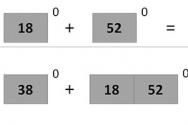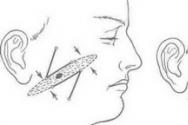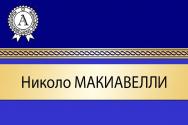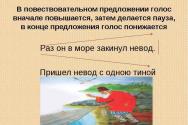Perfekt - German past tense - German online - Start Deutsch. Verb tenses Sentences in German in different tenses
Past tense (Präteritum)
Except Perfect (perfect tense) There is also a simple past tense in the German language - Präteritum(which in Latin means past past). It is formed using the suffix -t-. Compare:
Ich tanze. – I am dancing (present tense – Präsens).
Ich tanz t e. – I danced (past tense – Präteritum).
This is similar to the English past tense, where the sign of the past tense is the suffix -d-:
I dance – I danced.
Präsens Präteritum
ich sage - I say ich sagte - I said
wir, sie, Sie sagen wir, sie, Sie sagten
du sagst du sagtest
er sagt er sagte (!)
ihr sagt ihr sagtet
Feature Präteritum is what is in the form he she it) no personal ending added -t, that is: forms I And He match up. (As you remember, the same thing happens with modal verbs.)
As we have already said, the German language has strong (irregular, non-rule) verbs. Sagen – weak, regular verb. And here fallen – strong:
ich, er fiel (I, he fell), wir, sie, Sie fielen,
du fielst,
ihr fielt.
The past tense suffix is no longer needed here -t-, since the past tense is indicated by the changed word itself (compare with English: I see - I see, I saw - I saw). Forms I And He are the same, there are no personal endings in these forms (all the same as with modal verbs in the present tense).
So, the Russian phrase I bought beer It can be translated into German in two ways:
Ich kaufte Bier. – Präteritum (past tense).
Ich habe Bier gekauft. – Perfect (perfect tense).
What is the difference?
Perfect is used when an action committed in the past is connected with the present moment, when it is relevant. For example, you come home and your wife asks you (as they say, dreaming is not harmful):
Hast du Bier gekauft? – Did you buy beer?
Ja, ich habe Bier gekauft.(You answer with a sense of accomplishment).
She is not interested in the moment in the past when you bought beer, not in history, but in the result of the action - that is, the availability of beer. Is it done or not? Has it happened or not? Hence the name - Perfect (perfect tense).
Präteritum (past tense) used when an action performed in the past has nothing to do with the present moment. It's just a story, a story about some past events. That's why Perfect is used, as a rule, in conversation, in dialogue, when exchanging remarks (after all, it is in conversation that what is most often important is not the action itself in the past, but its relevance for the present, its result), and Präteritum- in a story, in a monologue. For example, you talk about how you spent your vacation:
Ich kaufte ein paar Flaschen Bier... Dann ging ich an den Strand... – I bought a few bottles of beer, went to the beach...
Or tell your child a fairy tale:
Es war einmal ein König, der hatte drei Töchter... - Once upon a time there was a king, he had three daughters...
Ich kam, ich sah, ich siegte. – I came, I saw, I conquered.
Because the Präteritum needed, as a rule, for a story, then the second person form ( you you) are rarely used. Even in a question to a person telling about something, it is more often used Perfect – so used to it that this form is for replicas, Präteritum with this interruption of the narrator it sounds very literary (albeit beautiful): Kauftest du Bier? Gingt ihr dann an den Strand? Basically, you will encounter and use the following two forms:
(ich, er) kaufte, wir (sie) kauften– for weak verbs,
(ich, er) ging, wir (sie) gingen– for strong verbs.
Table - formation of the preterite:
So: in conversation you use Perfect, in a story (about events not related to the present moment) - Präteritum.
However Präteritum verbs sein, haben and modal verbs (+ verb wissen) is also used in conversation - along with Perfect:
Ich war in der Türkei. (Präteritum) – I was in Turkey.
= Ich bin in der Türkei gewesen. (Perfect)
Ich hatte einen Hund. (Präteritum) – I had a dog.
= Ich habe einen Hund gehabt. (Perfect)
Ich musste ihr helfen. (Präteritum) – I had to help her.
= Ich habe ihr helfen müssen. (Perfect)
Ich wusste das. (Präteritum) - I knew it.
Ich habe das gewusst. (Perfect)
Past tense forms sein -> war (du warst, er war, wir waren…) And haben -> hatte (du hattest, er hatte, wir hatten…) need to remember.
Modal verbs form Präteritum as weak - by inserting a suffix -t-, with the only peculiarity that Umlaut (mutation) in this case it “evaporates”: müssen -> musste, sollen -> sollte, dürfen -> durfte, können -> konnte, wollen -> wollte.
For example:
Ich konnte in die Schweiz fahren. Ich hatte Glück. Ich war noch nie in der Schweiz. – I was able to go to Switzerland. I was lucky (I was lucky). I've never been to Switzerland before.
Separately, you need to remember: mögen -> mochte:
Ich mochte früher Käse. Jetzt mag ich keinen Käse. – I used to love cheese. Now I don't like cheese.
Now we can write down the so-called basic forms of the verb (Grundformen):
Infinitiv Präteritum Partizip 2
kaufen kaufte gekauft
(buy) (bought) (purchased)
trinken trunk getrunken
For weak verbs, there is no need to memorize the basic forms, since they are formed regularly. The basic forms of strong verbs must be memorized (as, by the way, in English: drink – drank – drunk, see – saw – seen…)
For some strong verbs, as you remember, you need to remember the present tense form (Präsens) – for forms You And he she it): nehmen – er nimmt (he takes), fallen – er fällt (he falls).
Of particular note is a small group of verbs intermediate between weak and strong:
denken – dachte – gedacht (to think),
bringen – brachte – gebracht (bring),
kennen – kannte – gekannt (to know, to be familiar),
nennen – nannte – genannt (to name),
rennen – rannte – gerannt (run, rush),
senden – sandte – gesandt (to send),
(sich) wenden – wandte – gewandt (to address).
They get in Präteritum and in Partizip 2 suffix -t, like weak verbs, but at the same time they change the root, like many strong ones.
For senden And wenden weak forms are also possible (although strong (with -A-) are used more often:
Wir sandten/sendeten Ihnen vor vier Wochen unsere Angebotsliste. – We sent you a list of proposals four weeks ago.
Sie wandte/wendete kein Auge von ihm. – She didn’t take her eyes off him (didn’t turn away).
Haben Sie sich an die zuständige Stelle gewandt/gewendet? – Have you contacted the appropriate (responsible) authority?
If senden has the meaning broadcast, A wenden – change direction, turn over, then only weak forms are possible:
Wir sendeten Nachrichten. - We conveyed the news.
Er wendete den Wagen (wendete das Schnitzel). – He turned the car (turned the schnitzel over).
Jetzt hat sich das Blatt gewendet. – Now the page has turned (i.e. new times have come).
There are several cases where the same verb can be both weak and strong. At the same time, its meaning changes. For example, hängen in meaning hang has weak forms, and in the meaning hang - strong (and in general, in such “double” verbs, the active “double”, as a rule, has weak forms, and the passive one has strong forms):
Sie hängte das neue Bild an die Wand. – She hung a new picture on the wall.
Das Bild hing schief an der Wand. – The picture hung crookedly on the wall.
Hast du die Wäsche aufgehängt? -Have you hung up your laundry?
Der Anzug hat lange im Schrank gehangen. – This suit hung in the closet for a long time.
Verb erschrecken – weak if it means frighten, and strong if it means get scared:
Er erschreckte sie mit einer Spielzeugpistole. “He scared her with a toy gun.”
Sein Aussehen hat mich erschreckt. – His (appearance) frightened me.
Erschrecke nicht! - Do not scare!
Sie erschrak bei seinem Anblick. – She was scared when she saw him (literally: when she saw him).
Ich bin über sein Aussehen erschrocken. – I’m scared by his appearance (the way he looks).
Erschrick nicht! - Do not be afraid!
Verb bewegen could mean like move, set in motion(and then he is weak), so encourage(strong):
Sie bewegte sich im Schlaf. – She moved (i.e., tossed and turned) in her sleep.
Die Geschichte hat mich sehr bewegt. – This story really touched me.
Sie bewog ihn zum Nachgeben. – She prompted, forced him to yield (prompted him to yield).
Die Ereignisse der letzten Wochen haben ihn bewogen, die Stadt zu verlassen. “The events of recent weeks have prompted him to leave the city.
Verb schaffen - weak in meaning to work hard, to cope with something(by the way, the motto of the Swabians, and indeed the Germans in general: schaffen, sparen, Häusle bauen - to work, save, build a house) and strong in meaning create, create:
Er schaffte die Abschlussprüfung spielend. – He passed the final exam effortlessly.
Wir haben das geschafft! – We achieved it, we did it!
Am Anfang schuf Gott Himmel und Erde. – In the beginning, God created the heavens and the earth.
Die Maßnahmen haben kaum neue Arbeitsplätze geschaffen. – These events did not create new jobs.
words, it is impossible to ask a question to them. They only convey all sorts of emotions without naming them specifically, for example:
Hurra! Er hat gewonnen! - Hooray! He won!
3. The system of tense forms in the German language.
German verbs are a significant part of speech, the peculiarity of which is the change in numbers (singular and plural), persons (1-2-3), moods (imperative, subjunctive and indicative), voices (passive and active) and tenses. The general concept of time in German corresponds to Russian - the action can take place in the past, future or present, only there are slightly more future and past tenses in German than in Russian.
Verb tenses in German are distributed as follows: there is one form of the present, two of the future and three of the past, that is, there are a total of six tense forms (two simple and four complex).
Euer Fahrer parkt jetzt hinter der Garage. – Your driver is now parking behind the garage. (Here is the simple present Präsens).
Meine Hausgehilfin wird morgen alles aufräumen. - My housekeeper will clean everything tomorrow. (The complex future Futurum I is used here).
Wenn ihr morgen zurückkehrt, wird sie die Wohnung bestens aufgeräumt haben . – When you return tomorrow (at your arrival), she will clean the apartment in the best possible way. (Here we use the complex future Futurum II, which is infrequent in German speech, used in cases requiring appropriate coordination of tenses).
Gestern tapezierten sie das kleinste Zimmer in ihrem Haus. -
Yesterday they wallpapered the smallest room in their house. (Here the verb is in the simple past Imperfekt /
Präteritum).
Im Waldsee haben unsere Kinder wunderschön gebadet. - IN
Our children had a great swim in the forest lake. (The complex form of the past Perfect is used here).
Als Peter das Elternhaus erreichte, hatten die Gäste schon alles aufgegessen und ausgetrunken . – When Peter got to his parents’ house, the guests had already eaten and drank everything. (Here the verb
stands in the past complex Plusquamperfekt, necessary to coordinate tenses in the past).
Why and in what cases are different tenses of German verbs used, and what they mean.
The simple present Präsens reflects states, processes or actions that exist, occur or are performed at the current moment in time. This tense is called simple insofar as the predicate is expressed in the personal form of the semantic verb without the participation of service verbs. This time can also be used to convey actions, states, and processes into the future. In such cases, the future of what is happening is indicated by the corresponding adverbs and various phrases, for example: then - danach, the day after tomorrow - übermorgen, nach dem Vertragsablauf - after the end of the contract, etc.
The simple past Imperfekt / Präteritum is also expressed by the personal form of the semantic verb in a given tense (Imperfekt / Präteritum) and serves primarily to formulate monologue speech - stories, descriptions, etc.
The complex past Perfekt is formed by semantic verbs (in the form Partizip II) with the help of corresponding auxiliary verbs (sein or haben) in the personal form
V Präsens, and is used mainly in dialogues and short messages of various types. German verbs do not have such a grammatical category as aspect, so Perfekt can mean either a completed or an unfinished action in the past.
The complex past Plusquamperfekt is also formed by semantic verbs (in the form Partizip II) using the personal form of auxiliary verbs (sein or haben), but standing in Präteritum. At its core, Plusquamperfekt precedes the action in Perfekt and for this reason is called “pre-antecedent”. This tense is used in sentences where it is necessary to convey any action or state that took place in the past before another action or state mentioned in the same sentence, that is, the purpose of Plusquamperfekt is to convey not an independent, but a relative action.
Futur I, which represents the complex future, is formed using the personal form of the auxiliary verb werden and the Infinitiv of the semantic verb and is very often replaced in speech by the simple present Präsens.

Futur II, which is also a complex future, also consists of the service verb werden in the personal form and the semantic verb in the Infinitiv II form. This tense, like Plusquamperfekt, is intended to convey the relativity of an action, that is, it denotes an action that ends in the future before any other.
I. Present tense (Gegenwart) and past tense
Unlike the past, the present tense in German is expressed in one form - Präsens. It is formed from the stem of the infinitive + personal endings of verbs.
A feature of the verb system of the German language is the presence of strong and weak verbs. The conjugation of the verb in German depends on what type a certain verb belongs to. Most verbs exhibit qualities of the weak type, and the changes in their grammatical forms can be generally reduced to a simple general table, to which there are only a number of small clarifications.
Verb conjugation in German: Präsens and Präteritum of weak verbs
ending |
suffix + |
ending |
suffix + |
||
ending |
ending |
||||
From the table above it can be seen that the difference between Präteritum and Präsens is the absence of a personal verb ending in the third and first person singular - these two forms are the same. For a number of verbs that have certain vowel letters at the end of the stem - -m, d, -n, -t - the ending acquires an additional vowel letter “e” to ensure ease of pronunciation of the word. This happens when verbs are conjugated in all cases of the second person and in the third person singular in Präsens, for example:
Du redest immer nur über deine Familie. - You always talk only about your family. (Here we add an “e” to make pronunciation easier. The same is observed in the following examples).
Mein Bruder öffnet seinen Kühlschrank jede fünf Minuten. –
My brother opens his refrigerator every five minutes.
Ihr mietet eine Wohnung, ohne den Besitzer kennengelernt zu haben. – You rent an apartment without meeting the owner.
In the relatively few verbs that end the stem with vowels -s, -z, -ss, -x, the second-person ending Präsens is characterized by the loss of “s” at the end of “st”, for example:
Mit deinen Fragen reizt du immer meine Neugier. “You always spark my curiosity with your questions.” (Here we have a drop of the “s” in the second person Singular).
Du bezahlst keine Rechnungen. -You don't pay any bills. (In this example, we are not dropping the “s” in the second person Singular).
Verbs with the infinitive form ending in -eln lose the “e”
V first person Singular, and in first/third Plural a personal ending is added-n instead of the traditional -en, for example:
An seiner Tür klingle ich schon zehn Minuten. – I’ve been ringing his doorbell for ten minutes now (the first person of Singular).
Warum lächeln sie immer, wenn ich komme? – Why do they always smile when I come (third person Plural)?
Wir sprudeln heute wie verrückt. – Today we are spouting witticisms like crazy (first person of Plural).
For rare verbs with the infinitive form ending in –ern, the conjugation occurs in the same way as in the previous case described above, but in addition to this, in the first person Singular there may be another valid form without losing the “e”, for example:
Heute rudere/rudre ich nicht, ich habe Blasen an meinen
Handen. – Today I won’t row (steer the boat) – I have calluses on my hands. (The first option is more typical for literary German, and the second is inherent in colloquial German speech).
Strong verbs differ from weak verbal units in that they do not have a suffix in Präteritum, and when declension and formation of the main verb forms there is a characteristic change in the root vowels, and sometimes consonants, for example:
Dieser Beamte verspricht mir seine Unterstützung. “This official promises me his support.” (The third person Singular is formed from the infinitive versprechen with the vowel change of the root e
® i).
Euer Kind zerbrach die Lieblingstasse meiner Oma. – Your child broke my grandmother’s favorite cup. (As demonstrated in this example, the addition of a formative suffix of the form Präteritum –(e)te, as happens when conjugating weak verbs in German, does not occur with the strong verb “zerbrechen.”)
Ihr Vater ging zu seinem Rechtsanwalt. “Her father went to his lawyer. (The Präteritum form of the verb gehen demonstrates the alternation of vowels and consonants in the word root, as well as the characteristic lack of a personal ending in the third person Singular Präteritum).
The conjugation of strong verbs in German can be schematically presented in the form of the table below.
Verb conjugation in German: changing the personal endings of strong verbs
ending |
ending |
ending |
ending |
||
This conjugation table for strong verbs in German demonstrates only the personal endings acquired by verbs. The conjugation of strong German verbs from the point of view of root changes is not subject to special generalization, since it is based on only a number of certain patterns. For this reason, the basic verb forms and the characteristic changes in the root of such verbs during conjugation must be learned on the basis of any of the numerous tables of strong verbs. Such tables represent these not particularly numerous representatives of the German verbal system, both from the point of view of the formation of the three main forms, and from the position of dividing strong verbs into separate rows (die Ablautreihen), demonstrating the general patterns of vowel alternation within individual verb groups.
In addition to the already considered temporary form imperfect (Präteritum), to express actions, events and states,

Completed by the time of speech in the German language, there are two more temporary forms:
perfect (Perfekt),
plusquaperfect, or long past tense
(Plusquamperfekt).
Education and use of perfect (Perfekt).
The perfect is formed using the personal forms of the auxiliary verbs haben and sein (see paragraph 4 of this reference book) and the past participle (Partizip II). In this case, the verb sein is used with verbs denoting movement
(gehen, fahren, laufen, etc.) and change of state (verreisen, umziehen, auswandern, etc.), and with the verb bleiben.
Past participles (Partizip II) of weak verbs are formed from the stem of the infinitive using the prefix ge- and the ending –t. As for strong and irregular verbs, participles can be found in the third column of the special table.
leb -en – |
ich habe ge-leb-t |
|||
du hast ge-leb-t |
||||
er/sie/es/man hat ge- |
||||
leb-t |
||||
wir haben ge- leb -t |
||||
ge-leb -t |
||||
leb-t |
||||
les-en- |
ich habe gelesen |
|||
du hast gelesen |
||||
wir haben gelesen |
||||
ihr habt gelesen |
||||
ich bin ge- land- e-t |
|||
ge-land-e-t |
du bist ge-land- e-t |
||
ist ge- |
|||
land-e-t |
|||
wir sind ge-land- e-t |
|||
ihr seid ge-land- e-t |
|||
ge-land- |
|||
ich bin gegangen |
|||
du best gegangen |
|||
wir sind gegangen |
|||
ihr seid gegangen |
|||
sie/Sie sind gegangen |
|||
The perfect is usually used in oral speech to express actions and events completed in the past, but related to the present (unlike the imperfect).
Gestern bin ich ganzen Tag im Bett geblieben. Ich habe schon dieses Buch gelesen.
However, this rule is not absolute: for example, in fiction you can find the perfect next to the preterite. The main thing to remember at this stage of study: the perfect is used in oral speech, the imperfect in written speech.
In addition, it is important to know and understand that, unlike Russian, in the past tense in German there is no distinction between process and result (the perfect and imperfect forms we are accustomed to).
Formation and use of the plusquaperfect
(Plusquamperfekt).
This temporary form is used quite rarely; it is usually replaced by the previous two. This time denotes an action that was performed a long time ago or preceded some other action. Usually used to emphasize the sequence of two actions.
Nachdem ich meine Hausaufgaben gemacht hatte, spielte ich mit
Freunden draußen.
This tense form is formed using the auxiliary verbs haben and sein in the IMPERFECT and the past participle.
arbeiten – ich hatte gearbeitet, du hattest gearbeitet, er/sie/es/man hatte gearbeitet…
bleiben – ich war geblieben, du warst geblieben, er/sie/es/man war geblieben…
III. Future tense (Zukunft).
Considering the tenses of verbs in German, it is necessary to dwell on such forms as
Futurum II (FII).
Education and Use (FI)
FI is formed using the personal forms of the verb werden + infinitive:
Ich werde arbeiten, leben, studieren... Du wirst arbeiten, leben, studieren...
Er/sie/es/man wird arbeiten, leben, studieren… Wir werden arbeiten, leben, studieren…
Ihr werdet arbeiten, leben, studieren… Sie/Sie werden arbeiten, leben, studieren…
“Friends, if you want to learn and KNOW the German language, then you were not mistaken by visiting this site. I started learning German in June 2013, and on September 25, 2013 I passed the Start Deutsch A1 exam with a score of 90 ... fishing Thanks to Daniel and hard work, I achieved good results. Now I can do more than just construct simple sentences. read texts, but also communicate in German. I made the right choice when choosing a German teacher. Thank you very much, Daniel))))»
Kurnosova Olga,
Saint Petersburg
« »
Tatyana Brown,
Saint Petersburg
"Hello everybody! I express special gratitude to “DeutschKult” in the person of Daniil. Thank you, Daniel. Your special approach to learning German gives people confident knowledge of grammar and communication skills. ... and I. After less than 1 month of training, I successfully passed the exam (level A1). In the future I plan to continue studying German. Daniil’s competent learning algorithm and professionalism give confidence in one’s abilities and open up great personal potential. Friends, I recommend to everyone the right start - learn German with Daniil! I wish you all success!»
Kamaldinova Ekaterina,
Saint Petersburg
« »
Irina,
Moscow
“Before meeting Daniil, I studied German for two years, I knew the grammar, a fairly large number of words - but I couldn’t speak it at all! I thought that I would never be able to overcome the “stupor” and start ... speak German fluently, without painfully thinking about each phrase. A miracle has happened! Daniil was the first to help me not just speak, but think in German. Due to a large amount of conversational practice, discussing a variety of topics without preparation, careful immersion into the language environment occurs. Thank you, Daniil!»
Tatyana Khmylova,
Saint Petersburg
Leave feedback
All reviews (54) Community
All German grammar in human language!
The most important topics in German grammar (topics are best studied in the order in which they are published):
1. Sentence construction:
The German language has 3 schemes for constructing simple sentences. One way or another, any sentence in the German language fits into one of these schemes. First, let's remember a couple of terms: Subject - a noun in the nominative case (answering the question who? what?). The predicate is a verb. Circumstance - answers the question how, where, when, why,.... In other words, the circumstance clarifies the proposal. Examples of circumstances: today, after work, in Berlin, ...
And here are the proposal diagrams themselves:
- Subject -> predicate -> circumstances and everything else -> second verb, if present in the sentence.
- Circumstance -> predicate -> subject -> everything else -> second verb, if any
- (Question word) -> predicate -> subject -> everything else -> second verb, if any
2. Times:
There are 6 tenses in German (1 present, 3 past and 2 future):
Present tense (Präsens):
This is the simplest tense in German. To construct the present tense, you just need to put the verb in the correct conjugation:
Example: machen - to do
Examples:
Hans geht zur Arbeit. - Hans goes to work.
Der Computer arbeitet nicht. - Computer does not work.
Past tenses:
There are 3 past tenses in German. However, in fact, 2 times will be enough for you. The first is called "Präteritum" and the second "Perfekt". In most cases, both tenses are translated the same way into Russian. In official correspondence and in books "Präteritum" is used. In oral speech, "Perfekt" is usually used, although sometimes "Präteritum" is used.
Präteritum:
Here we first encounter the concept of regular (strong) and irregular (weak) verbs. The forms of regular verbs change according to a clear pattern. Forms of irregular verbs need to be memorized. You will find them in.
Regular verb: machen (Infinitiv) -> machte (Präteritum)
Conjugations of the verb machen in Präteritum:
Examples:
"Du machtest die Hausaufgabe!" - “You did your homework!”
"Du spieltest Fussball" - "You played football"
Irregular verb gehen (Infinitiv) -> ging (Präteritum)
Example:
"Du gingst nach Hause!" - “You were going home!”
Future tenses:
In German there are "Futur l" and "Futur ll" for the future tense. The Germans do not use “Futur ll” at all, and they usually replace “Futur ll” with the present tense (Präsens) indicating the future as a clarification.
Example: "Morgen gehen wir ins Kino." - "Tomorrow we are going to the cinema."
If you indicate a circumstance of the future tense (tomorrow, soon, in a week, etc.), then you can safely use the present tense to express plans for the future.
If we still consider the time “Futur l”, then it is constructed as follows:
Subject -> auxiliary verb "werden" -> everything else -> semantic verb in the form "Infinitiv".
Example: "Wir werden ins Kino gehen." - "We'll go to the cinema."(verbatim: "We're going to the cinema.")
Conjugations of the verb "werden"
3. Cases:
 Cases]
Cases]
4. Compound and compound sentences:

Thanks to these FORMS we can determine in what real time a particular action occurs.
There are 6 of them in total:
Er macht |
Present tense He does |
Er machte
Er hat gemacht
Er hatte gemacht |
Past tense He is with )d ate |
Er wild machen
Er wird gemacht haben |
Future He will/will do |
Präsens (present)
Education:
Example:
| schreiben -
suchen - machen - lernen - regnen - fragen - sprechen - lesen - geben - |
ich schreib+e
du such+st er mach + t sie learn + t es regn + et wir frag+en ihr sprech+t sie les+en Sie geb+en |
ich schreibe einen Brief.
du suchst den Schlüssel er macht die Hausafgabe sie lernt das Gedicht es regnet wir fragen den Lehrer ihr sprecht zusammen sie lesen den Roman Sie geben die Hoffnung |
(I'm writing a letter) (you're looking for the key) (he is doing his homework) (she learns a poem) (it's raining) (we ask the teacher) (you talk together) (they are reading a novel) (You give hope) |
So, in the second and third person singular (du and er /sie /es) some verbs change their root vowel (either “e” changes to “i”, or an umlaut appears).
This is explained by the fact that these are strong conjugation verbs:
du nimmst/er nimmt,
du hilfst/er hilft
du triffst / er trifft
du fährst / er fährt.
du sprichst/er spricht, etc.
- Function:
The main function of Present is to express action in the present tense: Ich lese
Gern Romane. - I enjoy reading novels. Mein Sohn fragt mich immer.
- - My son always asks me.
Present is also used to express the future tense, for example: Morgen gehe ich in die Bibliothek. Tomorrow I I'll go
(to the library. gehe
= Pr äsens, however, the action will take place tomorrow, i.e. in future) „Ich vergesse dich nicht“, sagte sie. Und: „ Kommst ?“ <...>
„The main function of Present is to express action in the present tense: du wieder
comme wieder “, sagte er. - I don't I'll forget ? <...>
you,” she said. And she added, “You you'll be back - I I'll be back
Conjugation of "philosophical" verbs in Präsens.
sein(be)
|
ich |
bin |
wir |
sind |
|
du |
bist |
ihr |
seid |
|
er sie es |
ist |
sie Sie |
sind |
haben(have)
|
ich |
habe |
wir |
haben |
|
du |
hast |
ihr |
habt |
|
er sie es |
hat |
sie Sie |
haben |
werden(become)
|
ich |
werde |
wir |
werden |
|
du |
wirst |
ihr |
werdet |
|
er sie es |
wild |
sie Sie |
werden |
Pr ä teritum / Imperfekt (past tense)
Sometimes Preterite is called Imperfect.
Education:
As for the formation of the Preterite, it is better to divide all verbs into two groups from the very beginning:
- Verbs weak conjugations and
- Verbs strong conjugations
Weak verbs so called because they obey one for all rule Preterite formations:
Example:
| machen
suchen lernen fragen reisen spielen sagen kaufen |
ich mach+ ´t` + e
du such+ ´t` + est er learn+ ´t` + e sie frag+ ´t` + e wir reis+ ´t` + en ihr spiel+ ´t` + et sie sag+ ´t` + en Sie kauf+ ´t` + en |
ich machte Fehler
du suchtest die Arbeit er lernte in der Schule sie fragte seinen Namen wir reisten in Alpen ihr spieltet zu laut sie sagten Sie kauften ein Auto |
(I made mistakes) (you were looking for a job) (he went to school) (she asked his name) (we traveled to the Alps) (you played too loud) (they said) (You bought a car) |
Strong verbs don't obey this rule and form Everyone preterminates in their own way. However, what they have in common is:
Verb stem with modified root vowel+ personal ending
Example :
| schr ei ben - f a hren - spr e chen- k o mmen- tr a gen- schl a fen - g e ben - fl ie gen- |
ich schr ie b du f u hr+st er spr a ch sie k a m wir tr u g+en ihr schl ie f+t sie g a b+en Sie fl o g+en |
(I wrote) (you were driving) (he said) (she came) (we carried / wore) (you slept) (they gave) (You were flying) |
NB! The first and third person singular forms (ich and er/sie/es) are the same, but only in appearance, not in content!
Conjugation of "philosophical" verbs in Präteritum:
sein(be)
|
ich |
war |
wir |
waren |
|
du |
warst |
ihr |
wart |
|
er sie es |
war |
sie Sie |
waren |
haben(have)
|
ich |
hatte |
wir |
hatten |
|
du |
hattest |
ihr |
hattet |
|
er sie es |
hatte |
sie Sie |
hatten |
werden(become)
|
ich |
wurde |
wir |
wurden |
|
du |
wurdest |
ihr |
wurdet |
|
er sie es |
wurde |
sie Sie |
wurden |
Function:
The preterite is used when narration, i.e. when the author tells something to the reader. For example, in stories, stories, fairy tales, histories, etc. Most often this is written language, although the narration can also be oral.
Example: Hermann Hesse “Der Wolf” (description of a very cold winter)
Seit Wochen stand die Luft klar, spröde und kalt. Bei Tage lagen die<...>Schneefelder mattweiß und endlos<...>, nachts ging klar und klein der Mond über sie<...>.
Das war eine schwere Zeit für die Tiere<...>. Die kleineren erfroren in Menge, auch Vögel erlagen dem Frost<...>. (Die Wolfe) litten furchtbar an Frost und Hunger.
...
Formation of subsequent tense forms: All previous forms were formed by one word (er mast ,sie suchte ,wir sprachen ich etc.). All subsequent tense forms of the verb are compound, i.e. These forms consist of two parts*:
· changeable auxiliary verb(haben, sein, werden) and
· immutable part(Partizip II (third base form of the verb) or Invinitiv (first base form of the verb)).
Perfect (past tense)
Education(this is a compound form of the verb):
haben/sein
+ Partizip II
(auxiliary verb in Present form)
(third main verb form)
Example:
Sofia hat ein neues Buch gelesen .
Sophia read a new book.
Ich habe schon mein Zimmer aufgeräumt .
I've already cleaned my room.
Die Kinder haben im Garten gespielt .
The children were playing in the garden.
1994 habe ich die Schule beendet .
IN 1994 I graduated from school.
Mischa hat gestern die Hausafgabe gemacht .
Yesterday Misha (s)d did his homework.
But when is it used?sein “?
In three cases:
1. Combined with verbs of motion : gehen, fahren, laufen, rennen, fliegen usw.
Wir sind ins Kino gegangen . - We went to the movies.
Diese Group ist nach Germany gefahren. - This group went to Germany.
2. With state transition verbs (for example, transition from sleep to wakefulness, from life to death and vice versa): einschlafen(fall asleep), aufwachen(wake up), aufstehen(stand up) sterben(die), etc.
Ich bin gestern um 23.00 eingeschlafen . - I fell asleep at 23.00 yesterday.
Er ist gestorben . - He died.
3. With a group of verbs: sein(be) , werden(become) bleiben(stay) , Gelingen(succeed) , misslingen(fail) , passieren(take place), geschehen(happen, happen) begegnen(meet), etc.
Chef ist im Office bis in die Nacht geblieben . The boss stayed in the office until nightfall.
Function:
|
Note: Many people try to correlate various tense forms of the past tense with the perfective/imperfective aspect in the Russian language. There is no need to do this. To express perfection/ imperfections in German speech other linguistic means are used, such as... ö auf einmal ..., ... pl tzlich ..., ... rasch ... or... langsam ..., ... nicht bis zum Ende ... etc. The main function of these temporary forms is narration in Preterite and message |
1. in Perfect. The perfect is used , in conversations in dialogues , mostly in oral speech. Unlike the Preterite, the Perfect bears the imprint messages
Example:
Wir haben , not narratives. gemacht gestern so viel sind ! Zuerst wir in der Stad gebummelt haben . Dann wir meinen Nachbarn getroffen hat . Er uns zu einer Party eingeladen . Wir haben gleich beshlossen haben , am Abend diese Party zu besuchen. Dann wir in einem Cafe zu Mittag Gegessen und uns in einem Park erholt haben wir kurz Tischtennis gespielt and Blasmusik gehört . Das hat ja Spass gemacht . Und am Abend sind wir zur Party gegangen . Und was hast du gemacht ?
Oh! Ich habe den ganzen Tag in der Bibliothek gearbeitet und mich auf die Prüfung vorbereitet . Hast duvergessen ?
Wir haben morgen Mathepr ü fung!
2. Oh weh!... The perfect is used to express previous action , if the overall narrative is described using Present (present form).)
Er in p isst hat zu Mittag, aber davor er die Hande .
gewaschen He is having lunch , and before that he washed
hands. Liebe Oma, heute schreibe ich dir meinen ersten Brief auf Deutsch. Gut, dass du mit mir oft Deutsch Gesprochen hast , das hilft
world sehr. Dear grandma, today I writing my first letter to you in German.
It's good that you often (before)
Example :
(auxiliary verb in Preterite form) (third main verb form)
Function:
Verb "
sein “ is used in the same cases as in the Perfect form (1. with verbs of movement, 2. with verbs of state transition, 3. with a group of verbs like “sein”, “werden”, “bleiben”, etc.) In general, the Plusquaperfect form is used exclusively to express a preceding action in relation to an action in the Preterite form, example: Er ass zu Mittag, aber davor aber davor .
gewaschen hatte gewaschen ate washed
, but before that he washed
Example:
|
Ich Futurum I (future tense) (first base form of the verb) werde . |
einen Brief schreiben I |
|
sein “ is used in the same cases as in the Perfect form (1. with verbs of movement, 2. with verbs of state transition, 3. with a group of verbs like “sein”, “werden”, “bleiben”, etc.) I will write/will write letter. wild . |
gewaschen in einer Firma arbeiten |
|
Wir werden will work at the office. . |
mal. |
|
schauen werden Let's see Sie . |
ja bestimmt viele Souveniers einkaufen You surely |
|
buy I will write/will write a lot of souvenirs. . |
Es regnen |
Function:
Will
rain. I will write/will write Futurum is used exclusively to express action in the future tense. Was außerhalb des allwissenden Internet los war, sich erst heute Abend in ganzer Pracht I will write/will write zeigen . Der Rest .
sich später heraustellen .
Der Rechner I will write/will write wild heruntergefahren Wie ?
die zukünftige Umweltpolitik I will write/will write aussehen Nach Prognosen des Umweltbundesamtes .
der motorisierte Personenverkehr und im noch stärkeren Maße der Straßengüterverkehr weiter
Education:
|
werden |
+ ansteigen |
|
Futurum II (future tense) |
(Infinitive II(auxiliary) |
Example:
|
Participant 2 + |
haben/sein) |
|
Er wird bestimmt die Hausaufgabe gemacht haben. |
He'll probably do his homework. |
Function:
Wir werden das Ziel erreicht haben.
We will surely reach our goal.
Präteritum Education Rules
As you remember, verbs in German are divided into strong and weak: the type of verb affects how the past tense form is formed. The main forms of the verb are the infinitive, preterite (Präteritum) and participle II (Partizip II), which is used to form some other temporary forms. Strong verbs change the vowel at the root, weak verbs do not change the vowels and form three forms according to the pattern: by adding a prefix to the stem of the verb ge- and suffix -t. For example:
gehen – ging – gegangen– strong verb
machen – machte – gemacht– weak verb
If the stem of the verb ends in -t or -d, before the suffix -t a connecting vowel appears "e". For example: arbeiten – arbeitete – gearbeitet. Remember, the stress falls on the first syllable after the prefix, and it is pronounced with a firm attack.
To distinguish a strong verb from a weak one, you can consult a dictionary, where root vowel changes are indicated after strong verbs. For example: waschen (u,a)– wash. If you decipher it, it will work out waschen (wusch, gewaschen). In addition, the list of strong verbs is organized in various tables; You can find one of these tables in Lesson 3.
Some verbs form participles without adding a prefix -ge.
This:
1) all weak verbs ending in -ieren: studieren – studierte – studiert;
2) strong and weak verbs with inseparable prefixes be-, ent-, er-, miss-, ver-, zer-: bekommen – bekam – bekommen;
3) weak verbs with prefixes de(s)-, dis-, in-, re-: reparieren – reparierte – repariert.
For verbs with separable prefixes in the second form (preterite), the prefix is placed after the main form, and in the third - after the prefix ge-: einladen – lud ein - eingeladen.
In a sentence, the detachable prefix forms a frame structure.
Any printed text is usually written using the preterite: this form forms a narrative, while in colloquial speech the perfect is more often used. The preterite changes in persons and numbers, and the 1st and 3rd person singular forms are the same. The 1st and 3rd person plural forms are also the same. Let's look at an example of conjugating strong and weak verbs in the preterite.
| kaufen - kaufte - gekauft - buy | |||
|---|---|---|---|
| ich | kaufte | wir | kaufte n |
| du | kaufte st | ihr | kaufte t |
| er/sie/es | kaufte | sie/Sie | kaufte n |
Here are a few more examples of using verbs in the preterite:
1) Arnold lud Monika zum Tee ein. — Arnold invited Monica to tea.
2) Wir arbeiteten am Samstag im Garten. — On Saturday we worked in the garden.
3) Er war nicht zy Hause. - He was not home.
4) Gestern rief sie mich an. - Yesterday she called me.
5) Sie tanzte die ganze Nacht. — They danced all night.
6) Unsere Freunde kammen uns besuchen. — Our friends came to visit us.
Now it's time to check how well you have understood the lesson information. Be careful and don't hesitate to return to the rule!
Lesson assignments
Exercise 1. Conjugate the following verbs.(You can find forms of irregular verbs in lesson 4.)
Glauben, bekommen, fragen, denken, haben.
Exercise 2. Open the brackets using the correct ending of the verb in the preterite.
1. Gestern (gehen) wir ins Kino.
2. Sie (singular) (arbeiten) sehr viel.
3. Ich (lesen) ein interessantes Buch.
4. Er (trinken) viel Kaffee.
5. Ihr (sein) freundlich.
6. Es (sein) kalt.
7. (spielen) du Klavier?
8. Sie (plural) (schreiben) einen Brief.
9. Ich (wohnen) in Moskau.
10. Er (haben) eine Wohnung in Berlin.
Answer 1.
Answer 2.
1. gingen
2. arbeitete
3. las
4. trunk
5.wart
6. war
7. spieltest
8. schrieben
9.wohnte
10.hatte








